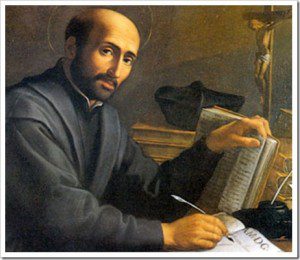By Megan Hoyt
The work of great composers will stand through the course of time because their music is so powerful, their talent and ability so rare, or because their unique personal lives so clearly inform their music. We love Rossini for his Duetto Buffo di Due Gatti (Humorous Duet for Two Cats). It’s a lighthearted tune based on his frustration with the mewling alley cats behind his house, who were so loud that he had trouble composing.
I love Rossini, but St. Hildegard of Bingen will always hold a special place in my heart for her haunting chants, her brilliant, incisive wit, the way she could take down a cardinal with a few choice words of conviction, her herbalism, and, of course, her glorious visions, which she insisted came directly from the Creator of the Universe Himself. Hildegard was a polymath, someone who has expertise in many different arenas. But unlike modern polymaths, Hildegard attributed all her talent and vast body of work to her Creator — she called herself merely “a feather on the breath of God.”
I first became enamored with Hildegard when her name came up in the music appreciation rotation of a curriculum I was using with a group of homeschooled children. Her music sounded like Gregorian chant to me. I found it a bit overwhelming at first – when I saw it written down, there were no measures. There was no time signature, no key. I tried unsuccessfully to sing one of her chants directly from the original musical score. I was way out of my element!
With some help from an online tutorial, I made it through singing my first chant, and yes, I cheated using music someone else had already altered to fit modern standards. I was able to teach it to a group of other teachers, who marveled at Hildegard’s great talent, and the mystery and awe to be found within her body of work. Not only was the music lilting and beautiful, the words were profound. I found myself drawn to God as I was singing, simply because the words I was saying were taking me to places only understood by the deep groanings of the spirit:
O breath of sanctity,
O fire of charity,
O sweet savor in the breast
And balm flooding hearts
With the fragrance of virtues.
From You clouds overflow, winds take wing,
Stones store up moisture,
Waters well forth in streams –
And earth swells with living green.
You are ever teaching the learned,
Made joyful by the breath
Of Wisdom.
What a remarkable ability Hildegard had of bringing to life the virtues of God, plainly stated, with flowing beauty! When I first heard her Veni Creator Spiritus, I was transfixed. It drove me straight back to my childhood, singing in the choir. This was the same music they used in the 1970s for their liturgy, back when the services were not quite so modernized as today.
I began rummaging through my 1940s hymnal, looking for other music attributed to Hildegard. I was enthralled. There’s something about childhood — certain tastes, smells, and music can take you immediately back to those pleasant times spent joyfully with family. Hildegard brought me back. Her music fanned the flames of a faith once sturdy and strong but now, in adulthood, a bit bent and fractured by the hard knocks we all face in life.
After I fell in love with her music, I began reading more about Hildegard’s life. Hildegard spent a great deal of her childhood in utter solitude as an anchoress, with only Jutta, her teacher to talk to or learn from. As she began to hear from God and receive visions, a scribe, Volmar, wrote them down. There was no glitz and glamour to her life, although she gained notoriety and authority as a wise Abbess. Her acclaim must have astonished her, as she considered herself God’s servant and the least of these. Here is a clip from a letter she wrote to Pope Anastasius. Remember, in the 12th century, it would have been sacrilege for a woman to teach a man. She was a brave soul.
“Oh man, you who sit on the papal throne, you despise God when you don’t hurl from yourself the evil but, even worse, embrace it and kiss it by silently tolerating corrupt men… You, O Rome, are like one in the throes of death. You will be so shaken that the strength of your feet, the feet on which you now stand, will disappear. For you don’t love the King’s daughter, justice, with glowing love but as in a delirium of sleep so that you push her away from you. . .Nevertheless, the high mountains will still offer the strength of their help to you; they will raise you up and support you with the strong branches of their high trees, so that you don’t completely collapse in your dignity, namely in the dignity of your marriage to Christ.” Hildegard of Bingen’s Book of Divine Works: With Letters and Songs
Too much for homeschooled children, or any children? I don’t think so. Again, there’s something about childhood. I believe children have within them a sweetness toward God that lends to a gentle and pure faith, like Hildegard’s.
Megan Hoyt is a veteran writer with credits in television and print. She teaches high school creative writing and composition. Her children’s book, Hildegard’s Gift, illustrated by David Hill, was released by Paraclete Press in 2014, and its trailer can be found at her website.
UPDATE:
In honor of Hildegard being named a Doctor of the Church, September 17 was also informally declared International Buy a Nun a Book Day by a small community of British nuns.














